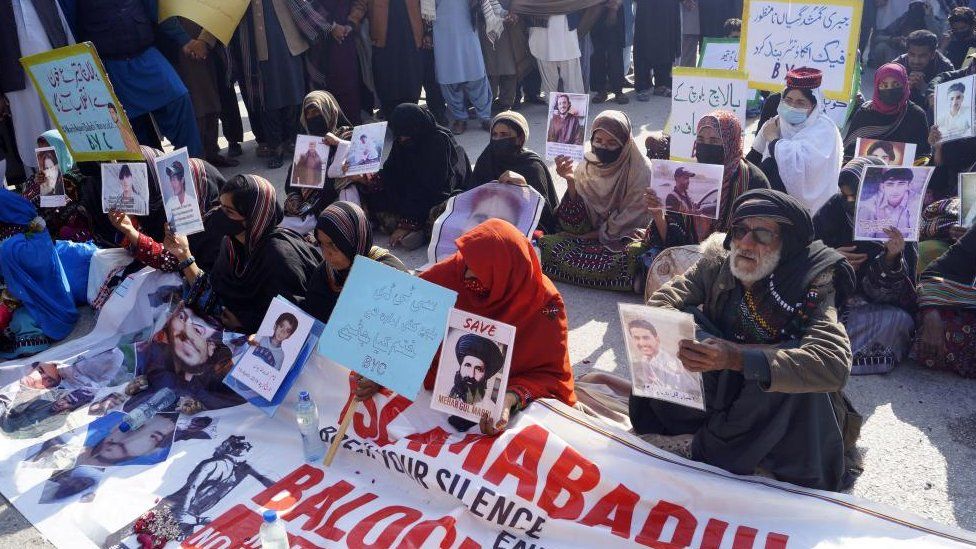Pakistan: Hundreds arrested, tear gas fired as female-led protests reach capital
- Published

Pakistani police fired tear gas and water cannons to disperse female-led protests in Islamabad on Thursday.
At least 200 people were arrested, including protest leader Mahrang Baloch, as they entered the capital.
Protesters have been marching across the country for weeks against alleged enforced disappearances of men in Balochistan province.
This was sparked by the death of a Baloch man whose relatives allege was shot dead while in police custody.
The march is "under attack by the Islamabad police," Ms Baloch said on X, formerly known as Twitter, at about 02:30 local time (21:30GMT).
The protesters were prevented from entering the Red Zone, which houses executive, judicial and legislative buildings in Islamabad, by police officers bearing batons and wearing protective head gear.
Videos posted on social media show chaotic scenes of officers bundling protestors into police vehicles. Many can be seen shouting and crying, while several are seated on the ground with visible wounds.
So-called enforced disappearances in Balochistan - Pakistan's largest province - refer to undeclared arrests allegedly made by intelligence services, that cannot be traced by courts and are not acknowledged by the government. Alleged victims have included political workers, journalists, human rights activists and students.
Such allegations have been made for decades, dating back to the birth of the Balochistan nationalist movement in the early 2000s.
Over the years, many Baloch women have sought justice for their missing loved ones and to bring the issue to global attention.
In the most recent case, Balach Mola Bakhsh, 24, was taken away by counter-terrorism police on 29 October. He was held for almost a month before authorities claimed that he had been caught in possession of explosives.
On 23 November, a day before his bail plea was scheduled to take place, the police said four "terrorists" from a "proscribed group", including Baksh, had been killed during a shootout with police in Turbat, a city in Balochistan. His family dispute the terrorism claim and say he died in police custody.
Protests - which organisers have called the "march against Baloch genocide" - started the day Bakhsh was said to have been killed. The protesters are demanding an end to enforced disappearances and extrajudicial killings, as well as accountability for those involved in the alleged extrajudicial killings of Baloch youth.
Speaking to the BBC before she was arrested, Ms Baloch said: "We started our march more than 26 days ago. We are hundreds and thousands of mothers, sisters and daughters of men [who] disappeared or [were] killed.
"[The authorities] will do anything to stop us, but we will not stop. We all are peaceful protesters and we will remain peaceful, even [when] they're not peaceful to us."
Additional reporting by Jewan Abdi
Related Topics
- Published28 December 2016
- Published22 February 2014